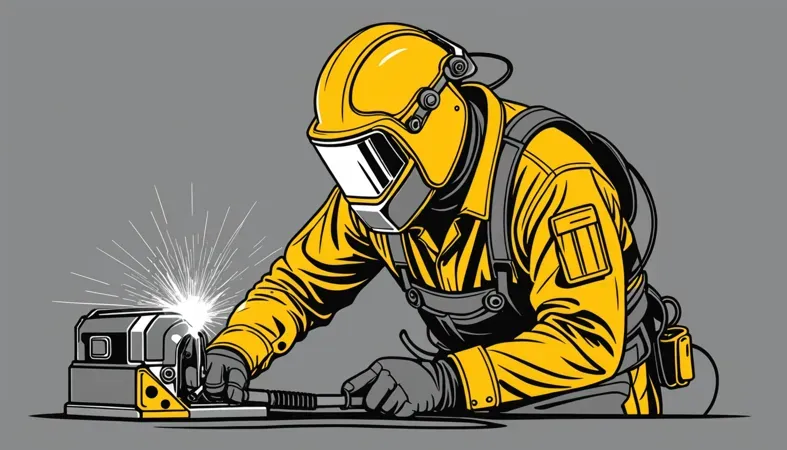How Much Does a Welder Make? Exploring Earnings, Types, and Factors.
Published on: November 16, 2024 | Last modified: March 4, 2025
By: Joe Carter
A welder is a skilled worker who fuses materials, typically metals, using heat and electricity. They create strong joints in construction, manufacturing, and repairs.
If you’re wondering how much does a welder make, it’s a crucial question. Your earnings depend on your skills, experience, and the type of welding you do. I’ve seen welders in my circle earn from decent salaries to great ones, especially with specialized training.
In this guide, we’ll cover various topics like types of welders and their earnings, essential prerequisites to get started, steps to become a welder, safety tips, factors influencing welder earnings, and how much money can a welder make in different fields. You’ll also find details about common issues, aftercare, advanced tips, benefits of becoming a welder, and other earning options available.
Contents
- How Much Does A Welder Make?
- What is a Welder?
- Types Of Welders and Their Earnings
- Essential Prerequisites to Get Started
- Steps to Become a Welder
- Safety Tips
- Types Of Welding Jobs and Their Earnings
- Factors Influencing Welder Earnings
- Salary Range by Welding Specialization
- What Could Go Wrong: Common Issues
- Benefits Of Becoming a Welder
- Applications Across Different Fields
- Other Options for Earning As a Welder
- Frequently Asked Questions (FAQs)
- Conclusion
- References
How Much Does A Welder Make?
A welder joins metal pieces. So, how much does a welder make? On average, welders earn around $44,000 annually (About $21/hour) in the U.S. Factors like skill, location, and type of work can affect this significantly. When considering specific materials, it is crucial to understand the challenges that arise with them such as how to weld zinc plated steel.

What is a Welder?
A welder is a skilled tradesperson who joins metals using high heat. They work with various welding processes like MIG, TIG, and Stick welding. Welders generally operate at temperatures exceeding 1,649 degrees Celsius (3,000 Degrees Fahrenheit). In the U.S., there are over 500,000 welders, with an expected growth rate of 3% from 2020 to 2030.
Now, let’s discuss how much a welder makes. This varies widely based on factors like location and experience. Entry-level welders might start around $17 (USD) per hour, while seasoned professionals can earn over $30 (USD) per hour.
I’ve used welding for custom fabrication. In some projects, pay depended on complexity, with marine welders earning up to $38 (USD) per hour. It’s interesting to note that marine welder salaries can differ greatly, showing that specialty skills can significantly increase earning potential!
Types Of Welders and Their Earnings
What are the types of welders and how much do they make?
-
Arc Welders
Arc welders use electric currents to melt electrodes and join metals. They typically earn $40,000 to $60,000 annually, depending on experience, location, and industry—like construction or manufacturing. It’s essential to prioritize safety measures like wearing a mask, as welding without a mask can pose significant health risks.
-
MIG Welders
MIG welders use a wire feed to create strong bonds in materials like steel or aluminum. They earn between $35,000 and $50,000 per year. To boost earnings, consider certifications and local demand.
-
TIG Welders
TIG welders provide precision welding with a non-consumable tungsten electrode. They can earn $45,000 to $70,000 annually, especially in industries like aerospace or automotive where skills command higher pay.
-
Spot Welders
Spot welders connect metals at specific points using heat and pressure. Their earnings range from $30,000 to $50,000 per year. To improve pay, consider working in a factory setting and your ability to handle production lines. Delving into whether welding can be observed safely adds depth to understanding safety precautions in this field.
-
Flux-cored Welders
Flux-cored welders use a tubular wire filled with flux to weld metals. Their typical salary is between $35,000 and $55,000 annually. To increase income, seek jobs in sectors with structural welding, like shipbuilding.
We have now covered various types of welders and their earnings. Next, we will examine the essential prerequisites for getting started.
Essential Prerequisites to Get Started
What do you need to dive into welding and earnings?
- Welding Machine: You need a machine like the Lincoln Electric Power MIG 210 MP. It’s essential for flux-cored and MIG welding, affecting job opportunities and income.
- Consumables: Stock up on items like Miller Electric EC-3000 with tips. These ensure quality welds and influence your earning potential per job.
- Welding Rods: You’ll want rods like Hobart 404178. They’re designed for specific projects, impacting pay in specialized welder roles.
- Welding Cart: Consider a welding cart such as the Pro-Series Welding Cart. It’s crucial for organizing your gear, boosting efficiency and increasing earning potential.
We’ve wrapped up the essential prerequisites for getting started. Next up, we’ll look at the steps to become a welder.
Steps to Become a Welder
Now, we’ll cover steps to find out exactly how much a welder makes.
-
Research Salaries in Your Area
Start by investigating local welder salaries. For instance, welders in Ohio earn around $45,000 per year ($21.63 Per Hour) on average. In Texas, the average salary can reach $50,000 annually ($24.04 Per Hour). This information’s crucial for understanding the job market you’re entering.
Use websites like Glassdoor or Payscale to see how much marine welders or oil rig welders make. Interactive maps display data by state, making it easier to compare wages, helping determine your earning potential based on your location.
-
Consider Specialization Types
Next, think about specialties that could boost your pay. Certified welders skilled in underwater welding can earn $60,000 to $80,000 annually ($28.85 To $38.46 Per Hour). Pipeline welders also earn competitive salaries due to the demanding nature of their work.
Focus on certified welding, as those who excel often see higher incomes. Specializations increase pay and broaden job opportunities across various industries.
-
Gain Experience and Certifications
Experience directly impacts salary. Entry-level welders typically start around $30,000 per year ($14.42 Per Hour), while seasoned professionals can make over $75,000 annually ($36.06 Per Hour). Pursue certifications from organizations like the American Welding Society (AWS) to enhance your skills. Mastering techniques such as welding vertical is crucial to advancing in this field, and you can explore more about welding vertical joints to refine your expertise.
Obtaining certifications shows initiative, elevating your salary expectations. To set yourself apart, don’t skip this vital step—it can be a game changer.
-
Network With Other Welders
Networking is key. Connecting with fellow welders can open opportunities and provide insights into others’ earnings. Join local welding groups or online forums to learn how much other welders earn weekly or monthly.
These discussions can lead to job leads and accelerate your growth in the field. Sharing experiences helps you navigate the salary landscape more effectively.
-
Stay Up-to-date With Industry Trends
Keep an eye on trends that may affect wages. As technology evolves, skills in robotics and automation become increasingly valuable. Staying current improves employability and positions you for higher pay; adopting new skills can quickly surpass the average welder’s salary.
Subscribe to industry publications, attend workshops, or follow thought leaders on social media. By staying informed, you’ll spot opportunities to advance your career and increase your income.
We’ve wrapped up the steps to become a welder here. Next up, we’ll look at safety tips.
Safety Tips
Let’s explore essential welding safety precautions.
- Welding Helmet – Protects your eyes from intense light. Consider a Miller Optveil, known for its high-quality lens.
- Coveralls – Wear flame-resistant clothing. My favorite is the Carhartt FR Coverall for durability and comfort.
- Safety Gloves – Prevent hand injuries from sparks and heat. Choose heat-resistant leather gloves, such as Revco FR gloves.
- Fume Extraction – Proper ventilation reduces harmful fumes. A popular choice is the Lincoln Electric fume extractor, ensuring a healthier workspace.
Remember, safety isn’t just a precaution—it’s vital for your future!
We covered safety precautions, best practices, and personal protective equipment here. Next, we will cover various welding jobs and their earnings.

Types Of Welding Jobs and Their Earnings
Let’s explore the various types of welding, including Construction, Manufacturing, Maintenance, Pipelines, and Aerospace welding.
-
Construction Welding
Construction welders work on buildings, bridges, and other structures. They earn about $45,000 to $65,000 per year. This type requires structural welding skills and knowledge of safety regulations.
-
Manufacturing Welding
Manufacturing welders create products in factories, such as cars and appliances. Their average income is around $40,000 to $60,000 annually. This job typically involves MIG (Metal Inert Gas) and TIG (Tungsten Inert Gas) welding processes and precision work.
-
Maintenance Welding
Maintenance welders repair broken equipment and ensure everything operates smoothly. They usually make $47,000 to $67,000 each year. This role requires strong troubleshooting skills and involves working with various materials.
-
Pipelines Welding
Pipelines welders specialize in joining pipes for oil, natural gas, and water. Their earnings typically range from $60,000 to $85,000 annually. This field demands expertise in safety practices and knowledge of pipe metallurgy. Proper eye protection is crucial for welders as welding can hurt your eyes.
-
Aerospace Welding
Aerospace welders work on aircraft and spacecraft, ensuring high-quality repair and manufacturing. They can earn $70,000 to $100,000 or more each year. Mastering this field requires top-notch precision and exceptional attention to detail. Welding stainless steel involves releasing specific toxic substances, and understanding the toxic substance released during this process is crucial for safety.
Factors Influencing Welder Earnings
What factors impact how much you can earn as a welder?
-
Experience Level
Your experience makes a difference. Beginner welders earn around $37,000 yearly ($17.79/hour), while seasoned professionals can make up to $70,000 or more ($33.65/hour).
-
Geographic Location
Your location matters. In states like California, average welders make $56,000 ($26.92/hour), while Ohio welders average about $46,000 ($22.12/hour).
-
Industry Type
Check the industry you’re entering. Marine welders typically earn more, averaging around $70,000 ($33.65/hour), due to specialized skills compared to general construction welders.
-
Type Of Welding Skill
Different welding methods can affect your pay. For example, TIG (Tungsten Inert Gas) welders earn more, averaging about $58,000 ($27.88/hour), due to their precision skills.
-
Union Membership
Being in a union can boost your earnings. Union welders often enjoy better pay and benefits, earning $5,000 to $15,000 more annually than non-union welders.
Salary Range by Welding Specialization
Welding salaries vary widely across specializations. Let’s break down the general salary ranges for various welding fields, showing the potential earnings for each type.
| Type of Welder | Salary Range (Annual) | Hourly Rate (USD) |
|---|---|---|
| Entry-level Welders | $30,000 – $40,000 | $14.42 – $19.23 |
| Experienced Welders | $50,000 – $70,000 | $24.04 – $33.65 |
| Underwater Welders | $60,000 – $100,000+ | $28.85 – $48.08+ |
| Pipeliner Welders | $70,000 – $100,000+ | $33.65 – $48.08+ |
| Aerospace Welders | $70,000 – $120,000 | $33.65 – $57.69 |
| Marine Welders | $40,000 – $80,000 | $19.23 – $38.46 |
As you can see, specialization can lead you to significantly higher earnings. I bet you didn’t realize just how much diversifying your skills can affect your paycheck! Think about which specialization excites you the most!
What Could Go Wrong: Common Issues
Let’s look at issues unique to you as a welder.
-
Inaccurate Job Estimates
As a welder, you might underestimate time or materials. Identify this by reviewing project plans and tracking time closely. Add 10-20% padding to your estimates based on experience.
-
Skill Mismatches
You may find certain techniques outside your comfort zone. Consider taking specialized training courses to enhance your skills in various applications, from TIG (Tungsten Inert Gas) to MIG (Metal Inert Gas) welding. Mastering vertical welding is also crucial for challenging projects, and you can improve this skill by learning to weld uphill effectively.
-
Market Fluctuations
As a welder, staying updated on market rates is essential. Track regional wage trends monthly to understand shifts. If rates drop, adjust your services or specialize further.
-
Health Risks
For a welder, exposure to smoke and fumes is a concern. Use fume extractors to minimize exposure. Get regular health check-ups to spot issues early.
-
Job Safety Violations
If you’re noted for safety lapses, participate in daily briefings. Document safety checks diligently and conduct peer reviews. Correct violations immediately to maintain compliance.
Benefits Of Becoming a Welder
The main benefit of becoming a welder is the potential for a high income. I’ve used it to fund my family’s education—there’s financial stability in this career.
Moreover, welders enjoy job security across various industries, opportunities for overtime pay, and chances for career advancement. Plus, you get to work with your hands, creating tangible results, and there’s always demand for skilled workers. Isn’t that a win-win?
Applications Across Different Fields
People use welding to create strong connections in metal. It has many applications, including:
- Marine Industry: Welders craft and repair ship structures, like hulls, which enhance buoyancy and safety. The demand is high due to extensive ocean trade.
- Construction: Welders are vital for building bridges and skyscrapers. Their skills ensure structural integrity, making this work critical and often well-paid.
- Aerospace Sector: Precision welders join aircraft components, ensuring lightweight yet strong connections. This specialized work commands higher wages because of its complexity.
- Automotive Manufacturing: Welders assemble vehicle frames and parts. The demand for skilled welders directly affects salaries, especially in production-heavy regions.

Other Options for Earning As a Welder
If you’re looking for alternatives to boost your welding income, freelance work or side gigs might be for you. Platforms like Upwork and Fiverr let you connect with clients needing welding projects, such as custom fabrications or repairs. If there’s one thing I’ve gained from my journey, it’s that diversifying your skills, like learning to service welding machinery, can significantly increase your earnings.
Additionally, certifications are key for better pay. Consider options like AWS Certified Welding Inspector or a CWB (Canadian Welding Bureau) certification. Specialized fields, like marine welding, can sometimes offer higher rates, especially in areas with high demand. By focusing on obtaining relevant certifications, you might find valuable welding career guidance and discover a lucrative opportunity!
Exploring techniques for specific weld types can enhance your skill set, including knowing how to weld edge joints.
Frequently Asked Questions (FAQs)
Now let us look at some common questions I typically get asked.
What is the Highest Paid Welding Job?
The highest paid welding job often depends on the specialization and industry. For example, underwater welders can earn between $50,000 and $100,000 annually ($24 to $48 per hour). Certain jobs, like pipeline welding, may even exceed $100,000 based on experience and location.
Can I Make 100k As a Welder?
Yes, you can make 100k as a welder. Many welders working in high-demand areas or with specialized skills can achieve this income. In particular, jobs in oil and gas can lead to salaries well above that mark due to the labor intensity and skill sets required.
Is Welding a Good Career for Money?
Yes, welding can be a good career for money. The average welder earns around $41,000 annually ($20 Per Hour), but experienced welders or those specializing can significantly increase their earnings. Opportunities for overtime and contract work often boost income potential.
Do Welders Make Good Money in California?
Yes, welders make good money in California. The average welder in the state earns about $54,000 annually ($26 Per Hour), which is higher than the national average. Factors like living costs and demand for skilled welders play a role in these increased wages.
How Much Does a Marine Welder Make?
A marine welder can make between $40,000 and $70,000 annually ($19 to $34 Per Hour) based on experience and job scope. These jobs often require additional certifications due to the challenging environments marine welders face.
What Certifications Can Increase My Welder Salary?
Certifications like AWS (American Welding Society) or ASME (American Society Of Mechanical Engineers) can increase your welder salary. These credentials demonstrate advanced expertise, allowing you to secure higher-paying positions and specialized roles.
Conclusion
That brings us to the end of our discussion on how much does a welder make. We covered various aspects including types of welders and their earnings, essential prerequisites, steps to become a welder, safety tips, different welding jobs, factors that influence earnings, and even common issues welders face. We also explored the benefits of being a welder, possible applications across fields, and alternative earning options.
In wrapping up, the question of how much does a welder make can vary widely. On average, a welder makes around $20 to $30 (USD) per hour, depending on their experience and specialty. Marine welders or those working on oil rigs could see this number climb even higher, with earnings reaching $40 (USD) an hour or more. So, if you’re considering a career in welding, there’s quite a bit of earning potential out there.
For further insights and a deeper dive into all things welding, visit What is Welding, where you can find comprehensive guides and tutorials.
References
- American Welding Society. (2015). AWS D1.1/D1.1M: Structural Welding Code – Steel. Miami, FL: AWS.
- Miller Electric. (2021). Welding Safety: A Complete Guide. Appleton, WI: Miller Electric Manufacturing Company.
Joe Carter is a retired welding professional with over 40 years of hands-on experience in the industry, spanning ship repair, structural welding, and even underwater projects. Joe is a master of MIG, TIG, and Stick welding. Passionate about mentoring the next generation of welders, Joe now shares his decades of expertise and practical insights to help others build rewarding careers in welding.
American Welding Society, MIG Welding, Safety Tips, Types Of Welders, Welder Salaries, Welding, Welding Careers, Welding Certifications, Welding Earnings, Welding Safety







